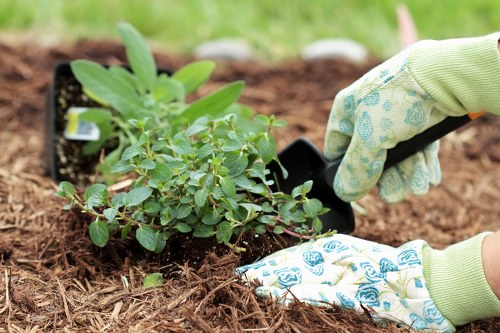Comprehensive Guide to Garden Maintenance in Forest Hill

Introduction to Garden Maintenance
Maintaining a beautiful garden requires dedication, knowledge, and the right resources. In Forest Hill, where the climate and soil conditions are unique, effective garden maintenance ensures that your outdoor space remains vibrant and healthy throughout the year.
Whether you're a seasoned gardener or a beginner, understanding the specific needs of your garden in Forest Hill is crucial. This guide covers essential tips and strategies to keep your garden thriving.
From selecting the right plants to implementing sustainable practices, we've got you covered. Let's delve into the world of garden maintenance tailored for Forest Hill residents.

Understanding the Climate of Forest Hill
Forest Hill experiences a temperate climate, characterized by moderate temperatures and regular rainfall. These conditions are ideal for a wide variety of plants, but they also pose certain challenges that gardeners must navigate.
The seasonal variations in Forest Hill mean that your garden's needs will change throughout the year. Proper planning and seasonal maintenance are key to ensuring long-term garden health.
Key Climate Factors:
- Average annual rainfall
- Temperature ranges
- Soil types and drainage
- Sunlight exposure

Soil Preparation and Maintenance
The foundation of any thriving garden is its soil. In Forest Hill, the soil tends to be rich in organic matter but may vary in pH levels. Regular soil testing helps determine the necessary amendments to create an optimal growing environment.
Soil Testing
Conducting soil tests annually provides insights into nutrient levels and pH balance. You can obtain a soil testing kit or consult with local agricultural extensions in Forest Hill for accurate results.
Amending the Soil
Based on soil test results, you may need to add compost, lime, or other organic matter to enhance fertility and structure. Proper soil amendment improves water retention and promotes healthy root development.
Mulching Techniques
Applying mulch not only conserves moisture but also suppresses weeds and regulates soil temperature. Organic mulches like wood chips or straw are excellent choices for Forest Hill gardens.

Plant Selection for Forest Hill Gardens
Choosing the right plants is essential for a successful garden. In Forest Hill, residents have access to a diverse range of native and adaptable plant species that can flourish in the local environment.
Native Plants
Native plants are well-suited to Forest Hill's climate and soil conditions. They require less maintenance, are more resistant to pests, and support local wildlife.
Perennials vs. Annuals
Perennials, which regrow every year, offer long-term beauty and require less replanting. Annuals, on the other hand, provide vibrant color throughout the growing season but need to be replanted annually.
Vegetable Gardens
For those interested in growing their own food, selecting the right vegetables that thrive in Forest Hill's climate is crucial. Consider planting varieties that are well-adapted to the local conditions.

Watering Strategies
Effective watering is vital for maintaining a healthy garden. Overwatering can lead to root rot, while under-watering can stress plants and reduce yields.
Drip Irrigation Systems
Installing drip irrigation ensures that water is delivered directly to the plant roots, minimizing evaporation and improving efficiency. This method is particularly beneficial in Forest Hill's temperate climate.
Rainwater Harvesting
Collecting rainwater is an eco-friendly way to water your garden. Utilizing barrels or tanks can help store water for use during dryer periods.
Watering Schedules
Establishing a consistent watering schedule based on plant needs and weather conditions helps maintain optimal moisture levels in the soil.

Pest and Weed Management
Maintaining a garden free from pests and weeds requires vigilant monitoring and effective strategies. In Forest Hill, integrated pest management (IPM) is a sustainable approach to addressing these challenges.
Identifying Common Pests
Familiarize yourself with the common pests in Forest Hill, such as aphids, caterpillars, and slugs. Early identification allows for prompt intervention.
Natural Pest Control
Encouraging beneficial insects like ladybugs and praying mantises can help control pest populations naturally.
Weed Prevention
Regular weeding and the use of mulch can significantly reduce the presence of unwanted plants in your garden.

Pruning and Trimming Techniques
Regular pruning and trimming are essential for the health and aesthetics of your garden. Proper techniques enhance plant growth and prevent disease.
When to Prune
Understanding the optimal times for pruning different plant species ensures that you do not harm their growth cycles.
Tools and Safety
Using the right tools, such as sharp shears and gloves, ensures effective pruning while maintaining safety.
Pruning Methods
Different plants require specific pruning methods. Researching and applying the correct techniques will promote robust plant health.

Seasonal Garden Maintenance
Each season presents unique challenges and tasks for garden maintenance. Adapting your maintenance routine to the changing seasons ensures year-round garden vitality.
Spring Maintenance
Spring is the ideal time for planting new flowers, fertilizing the soil, and preparing beds for the growing season.
Summer Care
During the summer, focus on proper watering, pest control, and deadheading to encourage continuous blooming.
Autumn Cleanup
As temperatures drop, it's important to clean up fallen leaves, mulch perennials, and prepare plants for winter dormancy.

Using Sustainable Practices
Sustainability in garden maintenance not only benefits the environment but also promotes healthy plant growth. Implementing eco-friendly practices can make your garden more resilient.
Composting
Creating a compost bin reduces waste and provides rich, organic fertilizer for your plants.
Organic Fertilizers
Using natural fertilizers instead of chemical alternatives supports soil health and reduces the risk of plant diseases.
Water Conservation
Adopting water-saving techniques, such as mulching and efficient irrigation, helps conserve water resources in your garden.

Creating a Garden Maintenance Schedule
A well-organized maintenance schedule ensures that all essential tasks are performed consistently, keeping your garden in top condition.
Daily Tasks
Daily inspections for pests, watering, and quick tidy-ups help maintain the overall health of your garden.
Weekly Routine
Weekly tasks may include weeding, pruning, and monitoring soil moisture levels to address any emerging issues.
Monthly Checklists
Monthly maintenance tasks involve deeper activities such as soil testing, fertilizing, and preparing for seasonal changes.

Hiring Professional Garden Maintenance Services
While DIY maintenance is rewarding, hiring professional services can provide expertise and save time. In Forest Hill, numerous professionals specialize in garden maintenance tailored to the local environment.
Benefits of Professional Services
Professionals bring knowledge, experience, and specialized tools that enhance the quality of garden maintenance.
Choosing the Right Service
When selecting a garden maintenance service in Forest Hill, consider their reputation, range of services, and customer reviews.
Cost Considerations
While hiring professionals is an investment, the long-term benefits of a well-maintained garden often outweigh the costs.

DIY Garden Maintenance Tips
For those who prefer a hands-on approach, here are some effective DIY tips to maintain your garden in Forest Hill.
Regular Monitoring
Consistently checking your plants for signs of stress, pests, or disease allows for prompt intervention.
Proper Tool Maintenance
Keeping your gardening tools clean and sharp ensures efficient and safe maintenance activities.
Creative Planting Techniques
Implementing techniques like companion planting and crop rotation can enhance plant health and yield.

Enhancing Garden Aesthetics
Aesthetic appeal is a significant aspect of garden maintenance. By incorporating design principles, you can create a visually pleasing outdoor space.
Color Coordination
Choosing plants with complementary colors creates a harmonious and attractive garden palette.
Garden Structures
Adding elements like pergolas, benches, and pathways enhances both functionality and visual interest.
Lighting Solutions
Proper lighting highlights garden features and extends the usability of your garden into the evening hours.

Maintaining Garden Equipment
Well-maintained equipment is essential for efficient garden maintenance. Regular upkeep ensures that tools perform optimally and last longer.
Cleaning and Storage
After each use, clean and properly store your gardening tools to prevent rust and damage.
Routine Maintenance
Regularly inspect tools for wear and tear, sharpening blades, and replacing any worn-out parts as needed.
Upgrading Equipment
Investing in high-quality tools can improve your maintenance efficiency and make gardening more enjoyable.

Conclusion
Effective garden maintenance in Forest Hill requires a combination of knowledge, planning, and effort. By understanding the local climate, selecting appropriate plants, and implementing sustainable practices, you can create and maintain a thriving garden.
Whether you choose to maintain your garden yourself or hire professional services, the key is consistency and attention to detail. Start implementing these strategies today to enjoy a beautiful and healthy garden all year round.
Contact us today to discover more about our garden maintenance services tailored specifically for Forest Hill residents, and book your service now to transform your outdoor space.
